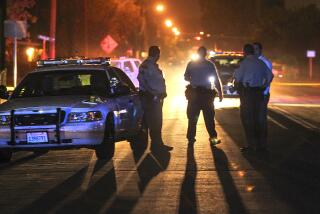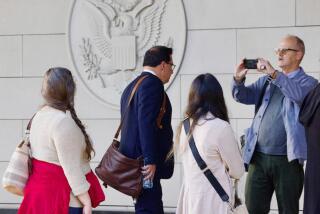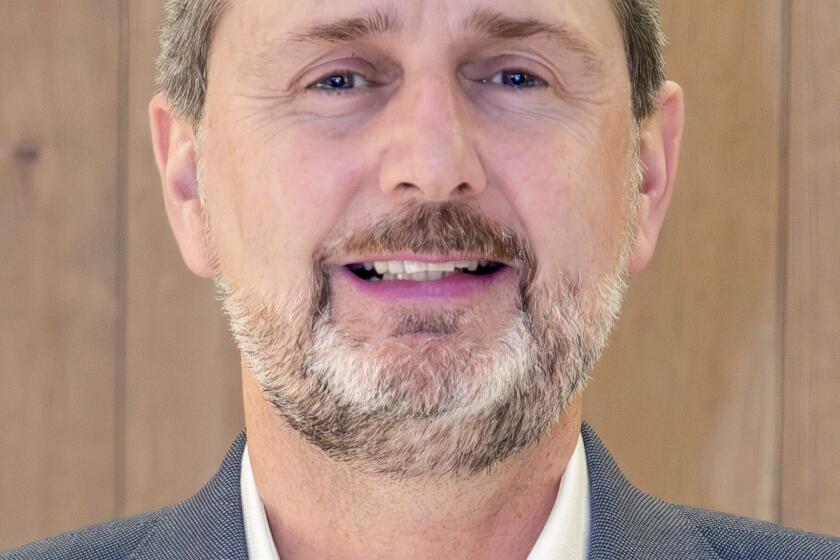A young shooting victim wrestles with his fears
After the nightmares started, Davien Graham avoided his bicycle.
In his dreams, he pedaled his silver BMX bike through his neighborhood, heard gunfire and died.
If I stay off my bike, I’ll be safe, he thought.
He placed it in a backyard shed, where it sat for months. But Jan. 12, 2008, dawned so spectacular that Davien decided to risk it.
He ate Cap’n Crunch Berries cereal, grabbed the bike and rode a half-mile west to Calvary Grace, a Southern Baptist church that was his haven.
Davien lived with an unemployed aunt and uncle, a former Crip, and five other kids in a cramped four-bedroom house in Monrovia, about 20 miles east of Los Angeles.
Yet as a 16-year-old junior at Monrovia High School, Davien earned A’s and B’s, played JV football and volunteered with the video club. He cleaned the church on Saturdays for minimum wage.
If I live right, God will protect me.
That afternoon, sweaty from cleaning, Davien reached for his wallet to buy a snack — only to realize he had forgotten it at home.
After returning to his house, he caught his reflection in the front window. He was 6 feet 2 and wiry. His skinny chest was beginning to broaden. He was trying to add weight to his 160-pound frame in time for varsity football tryouts.
He showered, told his aunt he would be right back and again jumped on his bike, size-14 Nike Jordans churning, heading for a convenience store near the church.
At the store, he bought Arizona fruit punch and lime chili Lay’s potato chips. He recognized a kindergarten-age Latino boy and bought him Twinkies.
Davien pedaled down the empty sidewalk along Peck Road. He could hear kids playing basketball nearby. As he neared the church, a car passed, going in the opposite direction. He barely noticed.
He heard car tires crunching on asphalt behind him. He glanced back, expecting a friend.
Instead he heard: “Hey, fool.”
The gun was gray. It had a slide. Davien recognized that much from watching the Military Channel.
Behind the barrel, he saw forearms braced to fire and the face of a Latino man, a former classmate.
The gunman shouted, “Dirt Rock!,” cursing a local black gang, the Duroc Crips.
Davien’s mind raced: Don’t panic. Watch the barrel. Duck.
Suddenly, he was falling. Then he was on the ground, looking up at the church steeple and the cross.
He heard more shots, but stopped feeling them. A chill crept up his legs.
Davien watched the sedan disappear down the street. He saw the boy he had bought the Twinkies for and other children spilling out of a nearby apartment building.
He was having trouble breathing. He felt sleepy.
He tried to raise his eyelids to see if the shooter was returning. He knew gangsters don’t like to leave witnesses.
::
Davien was raised not to snitch.
He grew up south of the Foothill Freeway and Monrovia’s quaint downtown, in a frayed, unincorporated area neighbors call No Man’s Land.
The oldest of six children, he learned as a small boy not to feel safe anywhere. He played under the towering pines and sweet gum trees of Pamela Park, where gangbangers stashed guns in bathrooms and addicts left crack pipes in sandboxes.
He witnessed his first drive-by when he was 4 years old. He came to recognize the sound, “like a loud drum, a thunderclap.”
He grew leery of sedans with tinted windows, “drive-by cars,” and gangsters who sprinted past his house and across “the wash,” a drainage canal, with police in pursuit.
For Davien’s safety, a relative had walked him to school — until he, too, was shot and his body dumped in the wash.
Davien had one goal in mind: to make it to his 21st birthday.
Drug dealers, bookies and hustlers called to him from the streets: “Hey, Day Day! You just like your dad.”
The comparison made him cringe. Davien’s father, Steven Graham, or Steve-O, was a Crip who pleaded guilty to cocaine possession weeks after Davien was born. Steve-O would spend several years in prison.
Afterward, on days Steve-O got high or drank too much, he would put on his sunglasses and take Davien out to the yard for lessons in manhood, often bringing a shotgun.
Davien’s mother, Sharri McGhee, also struggled with drugs.
Even so, when times were good, Davien felt as though he belonged to a normal family. His mother would check them into an Embassy Suites hotel so they could swim in the pool. It felt like Disneyland.
Then he woke up one morning and all his videos and the TV and VCR were gone, and he saw his dad walking home because he had sold the car, too.
By the time he started school, Davien had learned not to depend on adults for protection. He saw kids whisked away from their parents by the state, or sent to juvenile hall. He promised his younger brothers he would take care of them.
One day he found his pregnant mother lying on the back patio, convulsing. At the hospital, she delivered a premature baby girl with drugs in her system.
The state intervened. At age 9, Davien, two brothers and the baby were sent to live nearby with his aunt and uncle, Joni and Terry Alford, and their two children. Davien thought they acted more like big kids than parents.
The best way to become a man is to look at those around me, and do the opposite.
On Jan. 30, 2007, as Davien and his uncle walked in the neighborhood, they spotted a group of Latino men approaching, heads shaved gangbanger-style, arms covered in tattoos.
Suddenly, everyone was shouting in English and Spanish. Someone fired a gun.
His uncle stumbled off, shot in the calf.
Davien ran, hiding under a low brick garden wall. He could hear the strangers searching for him, their breath close. He wondered where his uncle had gone.
After they left, he bolted home, arriving to see paramedics lift his uncle into an ambulance. Sheriff’s deputies followed.
His uncle answered some of their questions. But he never identified the shooter. He wasn’t a snitch.
Deputies questioned Davien too. He knew he was supposed to tell the truth, as a Christian. But helping deputies would put his family at risk.
He didn’t describe the suspects. No one was arrested.
Davien soon began having the nightmares about getting shot on the silver BMX his uncle had given him.
::
As Davien lay bleeding on the grass, he played dead.
Through droopy eyelids, he watched cars brake for a stop sign across the street, then zoom off. He recognized one driver, a neighbor who looked away.
She must think I’m a gangster.
A red Ford Explorer slowed, windows rolled down. Davien took a chance.
“Ma’am, I need help, I’ve been shot!” he yelled.
The car stopped and a white lady with long red hair and glasses jumped out. She grabbed Davien’s hand and called 911.
It was 4:57 p.m.
“There is a young African American gentleman who has been shot,” the woman told dispatch. “There’s a lot of children out here as well, if you can kind of hurry.”
Davien groped for the cellphone in his pocket just as it started to vibrate.
It was his aunt. She and his uncle had been out on the front stoop and thought they heard gunfire.
“They shot me,” Davien said. He hung up so his aunt could call 911.
His uncle soon pulled up in the family’s white SUV. He cradled Davien’s body.
“I can’t move my legs!” Davien cried, loud enough for the 911 operator to hear.
His uncle grabbed the church’s water hose and held it to Davien’s lips. Davien stared up at Calvary Grace.
I don’t want to die.
He felt himself passing out, eyes rolling back into his head. He gripped the grass beneath him. His uncle was shouting his nickname.
“Day Day, come on!”
Paramedics arrived and loaded Davien into an ambulance. Just then his aunt rushed up. She was an imposing figure, heavyset, with tattoos and a deep voice. Los Angeles County sheriff’s deputies stopped her.
Had Davien belonged to a gang, they asked?
His aunt pointed to the church. Go ask somebody in there, she said as she climbed into the ambulance. Church folks would set them straight, she figured.
A block away at the convenience store, a witness called 911. She told the operator she saw three or four people flee in a black Nissan.
“I heard the pop, pop, pop. I turned, I didn’t want to look at the vehicle, I didn’t want them to see I saw them.”
“Did you actually see them do it?” the operator said.
“Yes, I did.”
“Are you going to talk to deputies?”
She paused.
“I’m a little concerned,” she said, her voice quavering. “I’m a little bit worried, too, for my safety and for my kids…”
By the time detectives interviewed her, the woman insisted she had not seen the shooter.
That left Davien as the only witness.
***
Davien awoke in intensive care. He didn’t know what day it was. He couldn’t tell if the sun was rising or setting.
A thick zipper of a scar sealed his chest. A tube jutted from his stomach, another from his arm. A ventilator covered his mouth, making a Darth Vader sound. He had trouble staying awake.
Below his waist, he felt nothing.
Doctors told him he was at Huntington Hospital in Pasadena, listed under a fake name as a precaution. He had been shot twice, in the left flank and right buttock. One bullet lodged in his ribs, another splintered.
Surgeons had labored for five hours to patch his left lung, remove his left kidney and his spleen. They could do nothing to repair his L1 vertebra. His legs were paralyzed.
A nurse brought pad and pen. Davien wanted to tell his family about the shooting. He had recognized the shooter, but he was too scared to write down a name.
Instead, he scribbled: “I forgive them.”
Days later, Sheriff’s Det. Scott Schulze showed up at Davien’s bedside with a series of mug shots.
Davien spotted the shooter immediately. Jimmy Santana had taken gym classes with him in middle school and later joined a Latino gang, Monrovia Nuevo Varrio, or MNV.
The detective asked Davien if the shooter was among the photos.
Davien feared what could happen if he snitched. He also believed as a Christian that it was wrong to lie.
He circled Santana’s photo. Beside it he wrote: “It’s him.”
He was scared. And not just for himself.
Davien’s younger brothers looked a lot like him.
::
Seventeen days after the shooting, on Jan. 29, 2008, deputies arrested Santana at his mother’s house in Duarte. He would stay in jail until a preliminary hearing to determine if he should stand trial.
Investigators believed Davien was the victim of a 17-month war between black and Latino gangs, dating to a night when Latino gang members went gunning for Vincent Minor, a black Duroc Crip associate.
About 10 p.m. on Aug. 9, 2006, suspected members of Duarte Eastside, a Latino gang, arrived at Minor’s ranch house.
The gang sprayed the house with bullets from a 9mm handgun. One pierced a converted garage, killing Minor’s father, 54-year-old Michael Minor, who volunteered as a youth football coach.
Payback came within hours.
Three outraged Duroc Crips spied a Duarte Eastside gang member, Marcus Maturino, sipping a beer outside a house on Shrode Avenue, less than a mile from the first shooting.
The Crips fired with a .45 and a TEC-9 handgun. They missed.
Standing nearby was Nicole Kaster, an aspiring gym teacher. A bullet struck her in the face, killing her. She was 22.
Tit-for-tat retaliation followed — with 71 gang-related shootings by the end of 2007. Investigators struggled to make arrests. Witnesses disappeared, changed their stories or clammed up.
In June 2007, members of Monrovia Nuevo Varrio strode up to a black crowd at a park and opened fire, wounding one person.
Police arrested Santana and charged him with four counts of assault with a semiautomatic firearm. Later, a judge dismissed that case against him for lack of evidence.
Santana, 18, lived at home with his mother and older brother, a gang associate. Santana had been nicknamed Lil Tuffy by the gang and inducted into a clique called the Pee Wee Locos. On a bedroom wall, he had tacked an ode: “Enemies run from me, they’re all cowards, because I’m the shot caller with lots of power.”
On Dec. 12, a month before Davien was shot, two black men shot and killed 24-year-old Hector Acosta as he rode his motorcycle on Millbrae Avenue in Duarte. Acosta wasn’t a gang member.
Everyone knew what would come next: MNV would retaliate. This time, they would send a gangster who knew how to hit a target and could be trusted not to talk if he got caught.
::
Davien was in the hospital for eight weeks, undergoing multiple surgeries. He tried to puzzle out why God let him get shot.
His faith wavered. He began to doubt the wisdom of testifying against Santana.
On March 14, 2008, two months after the shooting, Davien was discharged. He returned to his aunt and uncle’s house in a wheelchair.
He was a wisp of his former self, 70 pounds lighter. Bones in his toes were brittle; doctors warned that if he ran into something in the chair, they could shatter.
Surgeons had removed the bullet from his ribs, but they could do nothing about the fragments near his spine. Hot fingers of pain yanked him awake at night, tugging the breath out of him.
God, give me just five minutes without it.
Davien was scheduled to testify at Santana’s preliminary hearing four days after being released from the hospital.
He couldn’t decide what to do. He worried that every approaching car might bring another drive-by. In a wheelchair, it would be hard to flee.
Relatives offered little help. Some were scared of being attacked; others were bent on revenge. Few trusted the police.
Davien returned to church looking for answers. On Palm Sunday, two days before Santana’s hearing, he entered the sanctuary with his aunt and uncle.
He tried to listen to the sermon but he couldn’t concentrate. His spine was throbbing again.
His uncle wheeled him out to the church parking lot.
You need to face your fear, his uncle said.
He started pushing Davien toward the front of the church, the site of the shooting.
His aunt joined them, followed by the pastor’s wife.
They crept forward. When they reached the sidewalk, their pace turned glacial.
“OK to go further?” his uncle asked.
Davien reluctantly nodded.
His aunt sobbed. The pastor’s wife held her.
Staring down that barren road, walled off by backyard fences, Davien saw himself back on the grass, bleeding.
He knew three people who had been gunned down in the Monrovia area since he was shot: a 16-year-old girl killed next to the church, a 19-year-old former Duarte High School football player and a 64-year-old man. None was a gang member.
If Santana could shoot me here, he thought, he could shoot anyone anywhere.
Davien couldn’t stand. But he could stand up.
“OK,” he told his uncle. “I’m straight.”
molly.hennessy-fiske@latimes.com
First of two parts. Next: The trial is delayed for years as Davien lives with fears of retaliation, unsure if he will testify.
More to Read
Start your day right
Sign up for Essential California for news, features and recommendations from the L.A. Times and beyond in your inbox six days a week.
You may occasionally receive promotional content from the Los Angeles Times.







